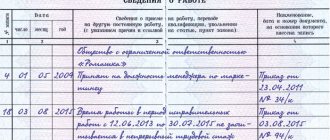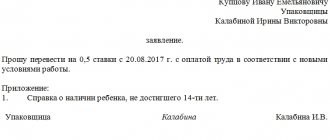Irregular working hours in the Ministry of Internal Affairs are a service necessity for a Russian citizen who has signed a contract to work in government agencies. When joining the police, you need to be prepared for delays in service after a worked shift, regardless of the time of day. To understand how the regime for involving employees of the Ministry of Internal Affairs in serving at odd hours, beyond the limits of the staffing schedule, is regulated, let us turn to the federal article of the law “On Police Service”.
The police guard the interests of people around the clock.
Irregular working hours for civil servants
Please note that the procedure for calculating contributions and taxes in the case of transferring an advance to the “physicist”-performer differs.
From this article you will learn:
- regulation of working hours of civil servants;
- irregular working hours for civil servants: design and features;
- for whom irregular working hours cannot be established.
Before moving on to studying the features of an irregular day, let’s consider how the working hours of civil servants are regulated.
According to the third and fourth paragraphs of article forty-six, the duration of the vacation is:
- for civil servants in senior and main positions - thirty-five days;
- for civil servants in civil service positions of other groups – thirty days.
If an employer wants to introduce an irregular working day, he needs: Having studied the ninety-seventh, ninety-ninth and one hundred and first articles of the Labor Code of the Russian Federation, we can come to the conclusion that it is impossible to establish an irregular working day for those who are prohibited from being involved in work outside of working hours.
Therefore, this list includes the following persons:
- pregnant women;
- minors;
- working during their apprenticeship.
It is also prohibited to engage workers with irregular hours outside of their regular schedule to perform functions that do not relate to their duties.
Irregular hours for civil servants From this article you will learn:
- regulation of working hours of civil servants;
- for whom irregular working hours cannot be established.
- irregular hours for civil servants: design and features;
Before moving on to studying the features of an irregular day, let’s consider how the working hours of civil servants are regulated.
Working (office) time and rest time Chapter 5. Working (office) time and rest time Article 27.
Working (office) time 2. The normal length of (office) time for a municipal employee cannot exceed 40 hours per week. A five-day work week is established for a municipal employee.
3. The list of municipal positions with irregular hours is established by the municipal legal act of the representative body.
Vacations for civil servants from 2020 Current as of: July 6, 2020
In particular, the changes concern the leave of state civil servants in 2020. Let's start with the fact that now civil servants holding senior and main positions are entitled to an annual basic paid leave of 35 calendar days, other civil servants - 30 calendar days.
Compensation for NSD
In case of an irregular working day in the Ministry of Internal Affairs, an employee involved in this type of service should be provided with compensation in the form of rest, the duration of which corresponds to the time spent.
In the event that an employee cannot immediately use the provided vacation, the days can be accumulated and subsequently used as additional vacation. Such leave, at the request of the employee, can be added to his main leave, or can be replaced with monetary compensation.
Concept and legislative framework
Modern Russian Federal legislation considers the definition of irregular working hours (Article 101 of the Labor Code) as a special labor regime, all conditions and agreements of which are established exclusively by a collective decision, with the mandatory participation of the employer and a representative from the employees.
The point is that representatives of the positions specified in the regulation on irregular working hours may periodically be involved by the employer in their direct work activities even after the expiration of the normal working day (for example, after work, or on weekends).
However, this must be specified in the employment contract with the consent of all parties.
What period of work can be considered “irregular” is a fairly common question that employees regularly face when applying for a job.
You can find a sample provision for irregular workers here.
At the same time, not only ordinary workers, but also employers themselves are not in all cases able to competently and consistently explain (including to their employees during employment): what is work activity with an irregular schedule. As a result, complex conflicts often arise, which sometimes have to be resolved through litigation.
According to the law, the employment contract or the local laws of the company’s work schedule must list all direct responsibilities without exception, as well as a full description and description of the scope of work of the employees for whom the irregular working hours procedure is introduced.
Equally important is the clear and consistent familiarization of the employee with all corporate official documents and regulations directly related to his activities as part of this organization.
This is important to do when hiring before signing an employment contract, since it is important to indicate that the employee is aware of the existence of a system of irregular working hours, and also that he is clearly aware of his responsibilities in accordance with the employment agreement in this context.
Often, when applying for a job, an applicant fills out a questionnaire in which there is a question about agreeing to work on an irregular schedule.
In the event of litigation, where the plaintiff may try to prove that the employment contract did not indicate certain responsibilities of the employees, which means the defendant is obliged to pay certain compensation.
The use of an irregular labor regime in budgetary organizations with a fixed salary may be allowed in special cases, when using the labor of persons working in specific positions specified in the relevant lists.
The introduction of a system of irregular working hours in a personal form is carried out according to the order of the head of the organization with notification to the employee no later than two months.
Employees for whom a general procedure for irregular working hours has been determined are freed from the need for any work activity on weekends and holidays, except in emergency situations, as well as situations initially discussed and agreed upon in the employment contract or local work schedule instructions.
If the employment contract does not contain any clauses regarding such work issues, then isolated cases of work during the period described above should be compensated in accordance with the general procedure.
Employees working under an irregular system may be assigned work under their work contract that will take more time to complete than standard working hours. Engaging these workers in this type of activity is not classified as overtime and is not paid overtime.
An irregular working day is a special labor regime, with special labor criteria, in which, according to Article 119 of the Labor Code, the employer is obliged to provide the employee with annual compensation in the form of leave (in addition to the main one).
The minimum amount of additional leave is three days, but the actual duration of paid leave when working in irregular hours is indicated when drawing up the corresponding employment contract.
At the same time, according to the order of Rostrud dated May 24, 2012, leave is granted to any employees working on an irregular working day system, regardless of the factors that attract them to work outside the standard working day.
Leave may also be granted to persons who combine part-time work and irregular work.
The employee, according to Art. 126 of the Labor Code, has the right to go to the employer with a request to replace paid leave with cash payments. But the employer is required by law only to promptly pay compensation to the employee in the established amount, and the employer can change the type of compensation at his own request.
Weekends and holidays
Reporting to work on weekends and holidays in the police occurs on a general basis, according to the shift schedule, regardless of whether the employee has a special duty permit according to his position or not.
Police officers who work hours beyond the required hours are given time off. For involvement in the performance of official duties on weekends and holidays, as well as for night shifts, an employee of the Ministry of Internal Affairs receives standard compensation in the form of time off or a cash equivalent in the appropriate amount.
How many hours does it last and to whom is it installed?
An irregular schedule does not imply the presence of standards for calculating hours, in contrast to standardized time, where the normal work schedule is precisely the sum of working hours that are compared with minimum or maximum indicators.
An irregular day is an excess of the standard work schedule, for example, if the typical work schedule is 9:00 - 20:00, then the deviation can be two hours. The conditions are drawn up individually when drawing up the appropriate contract.
We suggest you read: How to register ownership of land
Of course, not all employees of the company that signed the corresponding agreement work in this kind of labor regime, but only employees of special positions included in the corresponding list of specialties suitable for the irregular work schedule.
By order of the Federal Government No. 100, employees from the following categories can be included in the list of positions of employees with irregular working hours:
- Managerial, economic, material and technical staff;
- employees of an organization whose work activities during the working day are not subject to temporary reporting, i.e. various sales consultants, distributors, agents, etc.;
- employees of the organization who allocate their own time independently;
- employees of an organization whose work schedule, according to the nature of their activity, is divided into temporary parts of various durations.
The approval of a system of irregular working hours is also relevant for employees working part-time (although this does not include persons working part-time).
Separately, there is the issue of including in the list of positions of employees with irregular work schedules those individuals whose work activities do not lend themselves to specific time recording, or individuals who distribute individual working time at their own discretion.
They can, without the support of other employees or the employer, regulate all work-related problems that arise if questions arise about the “irregular” mode, i.e. exceeding the threshold of the normal work schedule, if this procedure is established by official job management, or in accordance with local regulations.
In these conditions, the basis for work under the system of irregular working hours is the personal initiative of a company employee, that is, in this case, there is no requirement for a prior decision from the company management to involve such an employee in work.
The system of irregular working hours, in addition, can be used for car owners of passenger cars, drivers organizing forwarding transportation, employees of design and survey organizations, and the like.
The duration of the shifts is selected individually, based on the labor productivity of each individual employee and according to the schedules of their work activities with a standard working week.
A special working day regime is introduced for such persons with confirmation of a representative from the employees.
At the same time, the formation of such an order is not considered a reason for non-compliance with the already existing laws of work routine within the company. All employees, without exception, are subject to working conditions determined by the Labor Code of the country, as well as local labor acts.
There is no legislatively established register of staff units falling under irregular working hours. Only recommendations on this topic are offered. The decision to determine the duration of working hours is made at the local level.
Government Decree No. 884 of December 11, 2002 examines the range of positions that may be involved in the workplace for more than the allotted time. This registry contains the following services:
- Management Personnel Division.
- Technical staff.
- Administrative and economic staff (AHO) employees.
- Employees with special work schedules. For example, a realtor, as part of his official duties, can show real estate at a time convenient for the client, that is, beyond the normal day.
- People of creative craft who have an obligation, but for whom the period of time when it will be fulfilled is not specified.
Employers have the right of official choice to determine irregular working hours. In private enterprises, the length of the working day is set at the discretion of management.
There is no clear formulation of NSD in labor legislation. Therefore, it can easily be confused with the concepts of overtime or overtime.
Additional vacation days for irregular working hours
Municipal vacation: new restrictions from 2020
Changes in the leave system for municipal employees since 2020 The annual basic paid leave for all municipal employees without exception is now 30 calendar days (Part.
3 tbsp. 21 of Law No. 25-FZ).
Duration of vacations for municipal employees While the whole country was resting and celebrating May Day, the President, with the stroke of his pen, reduced the duration of vacations for municipal employees. Changes made to the Law on Municipal Service unified the procedure for providing annual paid leave to state and municipal employees.
As far as I remember, deputies of the Arkhangelsk region introduced a bill regulating the duration of municipal vacations.
An employee performing a duty in the civil service in the Russian Federation enjoys social guarantees in the form of free vacation time for several days in a row with and without pay (DO).
Civil servants are entitled to additional leave for irregular working hours.
The basis for receiving leave without pay is the employee’s application in the event of extenuating circumstances in the form of:
- treatment in sanatorium-resort conditions;
- fulfilling duties according to public requirements;
- special circumstances in the family.
The Labor Code of the Russian Federation establishes the requirement to pay employees for additional rest.
In 2020, legislative norms were introduced giving civil servants the right to additional leave to the main annual paid leave:
- For length of service in accordance with Federal Law No. 79, Article 46.
- Irregular work schedule.
- For harmfulness and dangerous working conditions.
- Work in the Far North or similar areas.
The total duration of leave is calculated annually for each employee due to changes in seniority.
In 2020, a single duration of basic leave was introduced for all civil servants - 30 days. In accordance with Article 123 of the Labor Code of the Russian Federation, when drawing up a vacation schedule, the employer is obliged to take into account the wishes of employees.
A separate point is the determination of the employee’s next rest period, timed to coincide with the wife’s maternity leave.
The law allows you to divide your vacation into parts, taking into account that the part must be at least 14 days.
Public service is associated with certain costs and expenses that must be compensated. Costs in this case mean all sorts of prohibitions and requirements that limit the lives of civil servants. In the Russian Federation, the state guarantees compensation in the form of special benefits and preferences:
- increasing interest in the service of civil servants;
- ensuring social protection and legal security;
- staff strengthening;
- minimizing corruption cases.
All categories of civil servants are included in the main group of state guarantees. An additional group is represented by specialists from some districts or government agencies. Guarantees make it possible to:
- Optimize the order of service.
- Establish labor standards based on scientists.
- Provide labor safety measures.
- Optimize working and rest conditions.
This is achieved by setting a working week of 40 hours.
46 of Federal Law No. 79 and Article 21 of Federal Law No. 25, those filling positions with irregular working hours are entitled to 3 calendar days of additional leave.
Also, the above-mentioned agreement must necessarily indicate the duration of leave due to the employee for an irregular work schedule.
The duration of the vacation, which is at least 3 calendar days, is approved by the employer.
Civil servants with irregular working hours are granted additional leave
In accordance with Federal Law No. 342-FZ of November 30, 2011, an irregular duty schedule may be introduced for police officers holding senior and senior management positions.
According to the instructions of the internal police regulations, an irregular duty regime can be approved in relation to persons occupying positions corresponding to those included in the list of positions ratified by the Department of Internal Affairs that may be involved in irregular work.
At the same time, such employees are entitled to additional official leave in accordance with Part 5, Section 53 of the Federal Law of November 30, 2011.
What is NSD in the Ministry of Internal Affairs?
An irregular working day in the Ministry of Internal Affairs is the emergence of a need when an employee of the Ministry of Internal Affairs can be involved in the service and in the performance of duties associated with it, in excess of the established service schedule. That is, he may be involved in performing his duties, including at night, on holidays or on weekends. The procedure for recruitment to service is determined by executive authorities in the field of internal affairs.
Irregular working hours for civil servants
Everything you need to know about the working day of a civil servant In the Russian Federation, the length of the day of a civil servant is established by the rules of the government body. Let's figure out what a civil servant's working day consists of and whether it always complies with the labor code.
According to the labor code, the working week for civil servants is 40 hours.
Irregular working day (2) Irregular working day The concept of an irregular working day In the Letter of Rostrud dated 06/07/2008 N 1316-6-1 it is noted that an employee can be involved in the performance of his labor functions both before the start of the working day (shift) and after the end of the day (shifts). However, the legislation does not establish a maximum duration of work under irregular working hours.
On approval of the Regulations on the procedure and conditions for providing annual additional paid leave to municipal employees of the administration who have irregular days 25 dated 06/18/2010 Administration of the rural settlement of Pushnoy REGULATION On approval of the Regulations on the procedure and conditions for providing annual additional paid leave for municipal employees of the administration of the rural settlement of Pushnoy, Kola district, Murmansk region, who have an irregular day in accordance with the Federal Law “On Municipal Service in the Russian Federation” No. 25-FZ dated 02.
We suggest you read: Debt in the bailiff service, find out if there are debts, find information on how bailiffs collect debts
Irregular working hours The peculiarity of the considered working hours is that the employee is subject to the general working hours of the organization, but may stay at work at the request of the employer to perform his job duties beyond the usual work shift or be called to work before the start of the working day.
On the eve of the weekend, the duration of work in a six-day work week cannot exceed five hours.
– for overtime work (Article 99); – if the employee works on irregular working hours (Article 101). An employer's involvement of a municipal employee in overtime work is permitted with his written consent in the following cases: 2) when carrying out temporary work on the repair and restoration of mechanisms or structures in cases where their malfunction may cause the cessation of work for a significant number of employees; 3) to continue work if the replacement employee fails to appear, if the work does not allow a break.
In these cases, the employer is obliged to immediately take measures to replace the shift worker with another employee. An employer's involvement of a municipal employee in overtime work without his consent is permitted in the following cases: 1) when performing work necessary to prevent a catastrophe, industrial accident or eliminate the consequences of a catastrophe, industrial accident or natural disaster;
2) when carrying out socially necessary work to eliminate unforeseen circumstances that disrupt the normal functioning of water supply, gas supply, heating, lighting, sewerage, transport, and communications systems; In other cases, involvement in overtime work is permitted with the written consent of a municipal employee and taking into account the opinion of the elected body of the primary trade union organization.
- regulation of working hours of civil servants;
- for whom irregular working hours cannot be established.
- irregular hours for civil servants: design and features;
Working (office) time and rest time Chapter 5.
Working (office) time and rest time Article 27. Working (office) time 2. The normal length of (office) time for a municipal employee cannot exceed 40 hours per week.
A five-day work week is established for a municipal employee. 3. The list of municipal positions with irregular hours is established by the municipal legal act of the representative body. Vacations for civil servants from 2020 Current as of: July 6, 2020
Municipal vacation: new restrictions from 2020 Changes in the vacation system for municipal employees from 2020 The annual basic paid vacation for all municipal employees without exception is now 30 calendar days (as far as I remember, deputies of the Arkhangelsk Region introduced a bill regulating the duration of municipal vacations region According to the labor code, the working week for civil servants is 40 hours.
On approval of the Regulations on the procedure and conditions for providing annual additional paid leave to municipal employees of the administration who have irregular working hours
This resolution applies to legal relations that arose from May 1, 2010.
- Maximum additional days – 10.
- The annual main holiday period for all employees is now 30 days.
- You can now add only three days off for an irregular schedule.
The main one for municipal employees is 30 days.
It should be noted that this norm is regulated independently by the charters of the subjects.
The rules provided for in Art. 99 of the Labor Code of the Russian Federation for overtime work, indicating that its duration should not exceed 4 hours for each employee for two days in a row and 120 hours per year, do not apply to irregular working hours.
All economic sectors in the country operate stably with the assistance of special coordinating and managing bodies. A special law, which approved the foundations of the civil service in the Russian Federation, outlined the features of the functioning of the civil service.
An irregular working day for a civil servant requires payment of compensation.
The effectiveness of work depends on the level of qualifications of government officials. The activities of employees of state-owned organizations are carried out on a professional basis and represent a single whole.
The civil service system of the Russian Federation includes the following types: state civil service; military service; law enforcement agencies. Persons employed in the state civil service are civil servants who occupy a specific position to ensure state activities.
There are differences in the definitions of a federal civil servant (FGS) and a state civil servant (CSE). The FGS attracts employees to work from the Russian Federation and employees receive their salaries from the federal budget.
The State Civil Service is supported by funds from the constituent entities of the Russian Federation and funds from the federal budget. Additional payment to the State Civil Service is established by federal law; if the law is repealed, the additional remuneration is canceled.
The civil service operates in a system of complex and multifaceted social and legal education. The fundamentals are supported by strong legal, economic, social and organizational structures. This is where the peculiarities of the work of a civil servant come from, who embodies the connection between the state and the population of the country.
A person in public service is personally responsible for the assigned function of power. His work combines several branches of activity:
- executive function;
- managerial;
- innovative focus;
- a conservative line with ensuring constancy in society.
Making specific, unusual decisions during the period of reforms is innovative areas. For civil servants, remuneration is assessed based on the effectiveness of official actions.
Payments contain:
- Supplement to salary for many years of work. For example, an employee receives a monthly 10% additional payment for the years worked (5 years). In the future, each five-year period is marked with a 5% additional payment. The maximum increase is 1/3 of the official salary.
- Premium additional payments for the complexity and importance of tasks, which are determined individually in each civil service body.
- A bonus is paid for performing work related to state secrets or for special service conditions. The amount of additional payment can be 200% of the salary.
- Employees are provided with financial assistance. When you take your next vacation, a lump sum payment is issued. Functional responsibilities include modeling all possible consequences of human actions, the results of possible conflict situations, and the ability to act in special situations.
The Russian civil service is in a developmental stage with a lot of problems. There is a shortage of qualified workers, some civil servants are mired in corruption, there is no interest in the development and rise of the state.
The success of the state apparatus depends on the effective work of each civil servant.
Working hours for pregnant women according to the Labor Code
Overtime work is work performed by an employee on the initiative of the employer outside the working hours established for the employee: daily work (shift), and in the case of cumulative accounting of working hours - in excess of the normal number of working hours for the accounting period, Article 99 of the Labor Code of the Russian Federation.
Irregular working hours are a special work regime, according to which individual employees may, by order of the employer, if necessary, be occasionally involved in the performance of their labor functions outside the established working hours for them, Article 101 of the Labor Code of the Russian Federation.
We invite you to read everything about indexation of maternity capital: will the certificate be indexed in 2020?
Overtime work and irregular working hours are not the same thing, but they are the performance of labor functions outside the working hours established for employees.
Therefore, after all, even despite the fact that irregular working hours are not specified in Article 259 of the Labor Code of the Russian Federation, however, because This is the performance of labor functions outside the working hours established for employees, then you can refuse this work.
And such a moment, an irregular working day is displayed in the working time sheet, i.e. Data on actual time worked is entered.
For each calendar year, the Government approves the Production Calendar with the standard working time, and therefore, if, according to the working time sheet, you work more than is established by the Production Calendar for 2020, then you can refuse this work.
And also check whether you have an irregular working day, as I indicated to you above, that irregular working hours should be in your TD, your position is included in the list of positions for irregular working hours in the employer's LNA, for irregular working hours additional allowance is should also be indicated in the TD. And they should be involved in such work sporadically.
So, I think that I incorrectly applied Article 259 of the Labor Code of the Russian Federation in relation to irregular working hours.
So, until you have issued a medical certificate that prescribes “light” work for you, you work in accordance with the work and rest schedule that is established in your TD, but at the same time, no more than the standard working hours established by the PC for 2020, and necessarily in compliance with Article 259 of the Labor Code of the Russian Federation, irregular working hours, Article 101 of the Labor Code of the Russian Federation refers here to the performance of labor functions outside the working hours established for employees.
The pregnancy of one of the employees causes quite natural concern for the employer.
The establishment of this fact means that a woman has new rights, and the head of the organization, accordingly, has new responsibilities. And failure to comply risks liability.
Let's look at how to avoid conflict in such a situation.
If a pregnant woman wishes to exercise her right to have her working hours reduced, she applies to her employer.
She can do this at any time. The length of pregnancy or the woman’s work experience in the organization does not play any role.
Part-time work can be negotiated immediately when a woman in this position is hired. You can also return to your normal schedule at any time.
Sample employee statement
Registration and receipt of a pregnancy certificate imposes an obligation on the woman to undergo periodic medical examinations.
The working hours of medical institutions, as a rule, coincide with the working hours of most organizations and enterprises. This means that you have to undergo medical examination during working hours.
To ensure that a woman does not lose her earnings and does not refuse medical research on this basis, the legislator has provided a number of measures, namely, maintaining the woman’s average earnings during the medical examination.
In addition, her absence from work is not considered absenteeism. Even if she didn't warn the employer. It is enough to take a certificate from the clinic and provide it to the manager after visiting the doctor.
| Shortening the day (shift) | The number of working days does not change, but their duration decreases | 6 hours instead of 8 |
| Shortening the working week | The length of the working day does not change, but the number of working days decreases | Working days are Tuesday-Thursday instead of Monday-Friday |
| Shortening both the day and the week | The duration of each working day and their number are reduced | Work 6 hours from Monday to Thursday |
For example, manager Tarelkina’s working day is reduced from 8 hours to 6.5, and cleaner Chashkina is offered to work 4 instead of 5 working days.
The procedure for establishing part-time work for a pregnant woman will be as follows:
- Get a certificate about your condition from the antenatal clinic.
- Write an application addressed to the head of the organization. In it, indicate exactly how you would like to reduce working hours: shorten the day or get an additional day off. The duration of such a regime is also indicated. This can be either all the time before maternity leave or a shorter period of time.
- Submit the application and certificate to the personnel service. It would be a good idea to write the application in two copies. This will help if a controversial situation arises.
- Read the order establishing a part-time day and sign for it.
- Sign the supplementary agreement to the employment contract and keep one copy.
If the employer refuses to change the working hours, the woman can protect her rights by filing a complaint with the labor inspectorate. To do this, you will need a second copy of the application and a certificate of pregnancy.
Find out whether it is possible to hire pregnant women from our article.
How are salaries calculated for minors? See.
How to fire a single mother with a disabled child? Read.
How many hours does it last and to whom is it installed?
To begin with, you should fix the list of employee positions with irregular working hours in the main regulatory act - the regulation.
Lists of positions may be ratified by company branches, subject to slight local differences. But if it is necessary to develop a general aspect of the approach to closing this issue, it would be more correct to adopt a single list for the entire organization.
When hiring, the employment contract must reflect all relevant requirements and conditions regarding irregular working hours, or when changing the work schedule by concluding an additional agreement.
Download a sample additional agreement on irregular working hours here for free.
The mere written presence of a particular position in the approved list of specialties does not mean at all that an employee who fits the category of these positions will automatically be assigned to a normalized working regime.
We suggest you read: Vacation pay falls on public holidays
In addition, information about monetary compensation should certainly be recorded in the work contract or in an appendix to it.
The system of irregular work activities implies that employees (irregularly) can be involved in work activities that extend beyond the boundaries of the ordinary working day specified in the employment contract.
At the same time, the code does not specify what exactly this resolution should be (it is best to issue an order in writing).
When working on an irregular schedule, the employee is obliged to fulfill exclusively his own immediate work obligations. To perform any other activity not specified in the official employment contract, it is necessary to conclude an additional agreement (Article 60, Labor Code of the Russian Federation).
According to Article 284 of the Labor Code of the Russian Federation, part-time work does not allow exceeding a four-hour working day when combining work responsibilities.
However, it is possible to work a full shift if on some days a citizen finds himself free from his work duties at a second workplace.
That is, if an employee is able to combine work at his main workplace with working a full irregular shift at a second workplace, then he is registered as an ordinary employee, and he has access to all the same rights and responsibilities as other employees of the organization working under an irregular work schedule. .
However, the employer is obliged to indicate in the employment contract that this employee is registered as a part-time employee, and not as a full-time employee.
Is it possible to get money instead of a vacation?
An employee who has an irregular working day may, at his request, receive monetary compensation instead of additional leave. In this case, certain conditions must be met:
- additional leave is part of the leave in excess of 28 mandatory days of rest, which cannot be replaced with money (Article 126 of the Labor Code of the Russian Federation);
- the employee must show personal initiative and write a statement requesting that rest days be replaced with monetary compensation;
- the employer agrees to satisfy the employee’s request and certifies this with his signature on his application and issues a corresponding order.
There are categories of employees who, in any case, are not entitled to replace additional leave with money:
- pregnant women;
- workers under 18 years of age;
- people working in dangerous and harmful conditions.
An exception may be made when an employee is dismissed. In this case, the manager has the right to pay the cash equivalent for unused rest days.
Unused vacation days for irregular work hours are not lost. If an employee was unable to take advantage of legal rest this year, he can do so even several years later.
Topic 7
The employer is required to keep records of the time actually worked by each employee.
The duration of daily work (shift) cannot exceed: Ø for disabled people - in accordance with a medical report issued in the manner established by federal laws and other regulatory legal acts of the Russian Federation. Ø with a 36-hour work week – 8 hours. A collective agreement may provide for an increase in the duration of daily work (shift) compared to the duration of daily work (shift).
b) when carrying out temporary work on the repair and restoration of mechanisms or structures in cases where their malfunction may cause the cessation of work for a significant number of workers; c) to continue work if the replacement employee fails to appear, if the work does not allow a break.
Restrictions on business trips or irregular working hours
The Federal Labor Code does not contain any direct prohibitions on the establishment of irregular working hours or business trips for persons for whom, according to federal law, a reduction in the duration of the general labor regime has been taken into account (this includes persons under the age of majority, persons with disabilities of the first and second groups, pregnant women, etc. ).
Although experienced lawyers usually do not advise doing this, mainly due to the special legal status of these categories of persons, and, accordingly, their increased protection. This can cause many problems.
For example, problems may arise with various bodies protecting the rights of pregnant women, which, in the event of litigation, may appeal to the violation of the rights of a pregnant employee and refer to the lack of reduction in physical activity.
That is, the introduction of an irregular work schedule for pregnant women is in itself a reason for legal action by the relevant human rights bodies. In this case, the judicial authorities are more likely to take the side of the prosecution than the side of the defendant.
Time tracking
Work time records should be kept for each employee, excluding positions that do not provide for the possibility of such records.
However, these are internal corporate conventions, since the federal Labor Code, which officially regulates the recording of employee time, does not describe any direct exceptions. The Labor Code states that an employer must regularly keep track of the time worked by any of its employees.
Employees are paid wages precisely after checking the time sheet, and working time allocated above the standard working day during irregular working hours is not subject to overtime pay.
Taking into account the above information, today there are 3 main principles of approach to the problem of accounting for overtime work during irregular working hours:
- In the overtime work report sheet, you simply need to indicate the actual amount of time worked and recorded by the employee;
- all overworked time that goes beyond the boundaries of the standard working day must be recorded not in the time sheet, but in another internal corporate document, in accordance with the decision of the organization’s management;
- There is no need to document any overtime work at all.
You should always take into account the overtime period of your employees when filling out time sheets or other corporate documents.
This condition can significantly help in the future, during litigation, for example, when there is a need to clearly determine the circumstances under which the employee was at one time or another, and also to record the fact of his presence at the workplace (this may be important in situations such as injury at production).
Another annual vacation with payment
In the first year of work, employers try to provide vacation to the specialist in strict accordance with the article of the law on vacations. In the second and subsequent years of work, an employee can receive rest at any time during the working year according to the sequence practiced by a particular employer.
The duration of vacations for civil servants is determined by Article 46 of the Labor Code of the Russian Federation.
Vacation time includes weekends and holidays. During a well-deserved vacation, the employee retains his place at work and his position. He receives cash payments for his vacation.
Analyzing the workload of civil servants, it can be noted that in the Russian Federation, official time is often supplemented by the concept of an irregular day. The duration of annual leave is the sum of two periods: the main one for the working year and an additional one for a set of special work factors.
State civil servants of senior and main positions have a vacation of 35 days. Employees of other GS groups have a vacation of 30 calendar days. When calculating payments, additional vacations with pay are summed up.
For time worked, accruals are made in the following order:
- for up to 5 years of experience, 1 day is added to the vacation;
- a 5-day bonus is given for service from 5 to 10 years;
- working for 10–15 years gives an increase of 7 days;
- 15 or more years of work entitles you to 10 additional calendar days of vacation.
In addition to the basic leave, additional days are given for non-compliance, harmfulness or danger to work.
The Labor Code of the Russian Federation and Law No. 79-FZ consider the admissibility of transferring vacation to another time. This circumstance may be influenced by the decision of the employer, the employee himself, or special circumstances.
Compensation for unscheduled work activities
Every year, police officers are given additional leave for overtime service. The number of days off for non-staff leave begins based on the excess time worked.
An employee in internal bodies has the right to use time off at a time on the basis of a report submitted to a superior. He also has the right to accumulate time off in order to subsequently add the accumulated days off to the main leave according to the staff schedule.
If desired, the employee exercises the statutory right to additional leave in 3 ways:
- used in conjunction with the main one;
- takes time off for any period of time by submitting a report addressed to the boss;
- receives monetary compensation.
All employees in the Ministry of Internal Affairs, without exception, have the legal right to freelance leave for an irregular day, regardless of their overall length of service in the authorities. The number of additional days for additional leave is accrued in proportion to the time spent by the employee on the performance of job descriptions according to the type of non-compliance.
Police officers are given days off for overtime work.
Compensation
By virtue of legal regulations, an employee may partially replace paid time off with monetary compensation by submitting a written request. Annual paid vacation periods may be compensated. In situations where a service contract is terminated or an employee is dismissed, as well as when he is released from his position, he receives a financial payment for the number of unused vacation days.
In order to protect the health of the mother and child, women are not allowed by law (Article 126) to replace time off according to the BiR and regular vacation with monetary compensation. It is also not allowed to compensate employees for additional rest in hazardous areas of work. Only part of more than 7 days of vacation is reimbursed in money, if this circumstance is stipulated in industry agreements or collective agreements.
The term “service year” is used in legal documents. The situation may develop in such a way that several periods are not included in the total time worked (experience), then the service year will, for forced reasons, be shifted by some time relative to the calendar year.
Under the new conditions, accumulating vacation time is not allowed. In order to improve the actions of government agencies and structural associations in order to optimize the labor process, it is necessary to develop legislative practice.
Order for NSD
However, the decision to establish the NSD for each specific position remains with the relevant commanding officer, who has the right to issue an order for an irregular working day in the Ministry of Internal Affairs for a specific position. That is, the employee’s position must be included in the list, which can be changed and approved by the regional manager.
Let's say an employee's position is included in this list. What might this entail? The answer to this question is contained in the order of the Ministry of Internal Affairs No. 961 of November 19, 2012 “On approval of the procedure for attracting employees of the internal affairs bodies of the Russian Federation to perform official duties...”.
The eleventh paragraph of this order states that employees for whom the NSD is established may be involved in the performance of established official duties that go beyond the normal working hours. Moreover, it has been established that the data on recruitment to service are episodic in nature. These employees who have worked more than expected are given additional leave, rather than compensation for time worked in the appropriate amount.
But also the twelfth paragraph establishes that if such an employee is involved in service at night, as well as on holidays, which are days off, then he should be provided with compensation by allocating additional rest time in the appropriate amount. What could all this mean? Let's look at examples.









